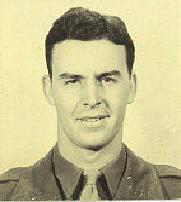

United States Army
DUTY, HONOR, COUNTRY
On December 8, 1942, while on a four year senatorial/athletic scholarship to the University of Pennsylvania, Philadelphia, I enlisted in the U. S. Army. I was nineteen years old.
Ninety-two days later I was ordered to basic training at Camp Wheeler, Georgia. As a private in basic training, I was selected to attend Officers Training School at Fort Benning, Georgia, and promoted to the rank of corporal.
I completed a four months’ intensive course with many paratroopers and was ranked third in my platoon. I was commissioned a Second Lieutenant and assigned to the 104th Infantry Division at Camp Carson, Colorado. After a very short training maneuver against the 80th Infantry Division at Yuma, Arizona Maneuvering Area, I was ordered to Fort Meade, Maryland, and then to Camp Shanks, New Jersey. I then boarded a convoy ship at the Brooklyn Navy Docks as one of two hundred Second Lieutenants General Fredendahl needed prior to the invasion of Europe.
At 3:OO AM I was awakened by the ship’s rolling from side to side. Not being a “sailor”, I had to go on deck for some fresh air, only to find out that we had not yet left the United States.
We sailed from New York City on May 11, 1944, in one of the largest convoys ever assembled, arriving in the Firth of Clyde, Scotland, on May 22, 1944. We then traveled by train to Yeovil, England. I was assigned a thirty-man platoon to take to the Third Replacement Depot for assignment to a combat unit in France.
At the very first muster of my platoon, I had to make sure that each man knew how to fire his basic weapon, the M-1 Garand rifle. I was taken aback when I learned that only twelve had ever fired the .30 caliber carbine or checked the gas mask they might have had to use if the Germans attacked using chemicals. We were already wearing impregnated clothing for protection against gas.
The next two days allowed us to become familiar with our basic weapon and gas mask. On the night prior to the June 5 invasion we were transferred to the docks at Southampton, England, to board the infantry landing craft that would take us across the English Channel to the Normandy beaches and D-Day. The memory of the smell of diesel fuel as I ate my half-cooked eggs remained with me many years, especially when I drove behind a diesel-fueled vehicle.
When I landed on Omaha Beach and saw my first dead American paratrooper, I became incensed by our enemy. That night, and for several succeeding nights, our convoy was strafed by a German pilot nick-named “Bed-Check Charlie” because he came by at eleven o’clock every night and remained until he ran short of fuel.
My second encounter with a death was when we moved out at night, and an ammunition carrier hauling canisters which held him up-right was run over by a heavy tracked vehicle. His body had twisted 90 degrees, but the canisters still held him erect.
Later, I met General George Patton while he was directing his armor units that were refueling for their rapid advance through France. I had been assigned to a combat engineering company that provided a floating pontoon bridge across the Rhine River near the Remagan railroad bridge.
We crossed the Rhine River and encircled the German armor divisions, and, with the aid of our Air Force, destroyed Hitler’s dreams of victory and the German’s attempt to gain access to the port of Antwerp, Netherlands, in the famous Battle of the Bulge.
Upon Germany’s unconditional surrender, we were transferred to the port of Cherbourg, France, to return through Camp Lucky Strike to the United States. This was on or about July 1, 1945. My assignment took me to Fort Bragg, North Carolina, in preparation for the attack on the Japanese mainland. Japan signed their unconditional surrender aboard the USS Missouri on V-J Day before my re-assignment.
My reserve commitment required me to attend two weeks of active duty at military posts each year to complete my twenty-years, six months of honorable service to earn my retirement as a Colonel on March 2, 1983.
My interest in veterans’ affairs was to establish the Coalition of Veterans Affairs (COVA) in Pittsburgh, Pennsylvania, to assist veterans to obtain rightful benefits and treatment that the Veterans Administration was unable to deliver because of the lack of funding by Congress. My current interest is with the office of Firing for Effect, a veterans’ watch-dog organization in Rochester, New York, that reminds Congress of the need for full mandatory funding for the Veterans Administration so that proper planning and care may be provided for our young volunteer veterans who have very serious mental and/or physical conditions as results of their dedication to DUTY, HONOR, and COUNTRY.
By Robert Brenner, March 31, 2008
